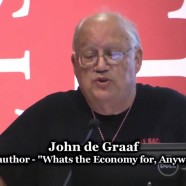
If Paul Revere were riding now with the purpose of warning America against a clear and present danger, he might well proclaim, “The robots are coming!” For indeed they are, and quickly. Until now, though technology has reduced jobs at an ever-increasing rate, we’ve been able to create new ones just as fast, though many of these have been low-wage service positions and others, low-security “gig economy” activity.
But the era of easy replacement and five percent unemployment may be quickly coming to an end. Automated check-outs reduce the need for clerks and tellers and new software may even soon eliminate such skilled positions as legal assistants and nurses. Driving, currently among the best options for working-class males, is not long for the market, with self-steering cars and trucks already logging millions of miles. The list of threatened jobs is long and growing longer.
Even as normally optimistic an economist as Larry Summers worries that there won’t be enough employment in the future, while others in his profession predict that as many as 40 percent of U.S. jobs will be history by 2030. So what can we do?
Most economists still seek the answer in economic growth, either through “supply-side” or “demand-driven” policies. On the Right, the supply-siders want to cut taxes to encourage investment and employment, but as wealth is funneled to the top, where will we find the consumer power that can purchase the new output? On the Left, proponents of demand advocate greater equality and Keynesian stimulus, a solution fairer and probably more efficacious than “trickle-down.” Yet, is such growth even possible or desirable on a finite planet?
OVERSHOOT
Since World War II, a mere 1/100th of a second if we reduce Earth’s 4.6 billion-year history to a single week, we’ve managed to use more resources than did all previous human beings combined. We’ve reduced our fossil fuels, fisheries, forests and soil by half, driven countless species to extinction and dramatically altered the climate. True, alternative technologies—solar power, for example—can reduce the impact of each new unit of consumption, but growth of the sort our economists salivate over is simply unsustainable over time. Already, we’re in overshoot, using fully 50 percent more renewable resources each year than Earth can regenerate.
In light of this, it is sheer madness to believe we can keep everyone working 40 hours a week indefinitely, producing and consuming more and more. And we don’t need to. Greater economic growth means important advances in well-being and happiness for poor countries, but for rich ones the gains level out or begin to fall. That’s where we are now. So neither stimulus nor tax-cutting is the answer. But what is?
FREE MONEY
Dutch historian and economist Rutger Bregman has the best ideas about this I’ve read. In his book, UTOPIA FOR REALISTS (titled FREE MONEY FOR EVERYONE in the original Dutch), Bregman makes a powerful case for two ideas that aren’t new but seem to have been forgotten by our leaders. First, he suggests a steady reduction in working hours (down to 15 per week) to allow us to share remaining work. We need to shorten and share work, but that will still not provide jobs for everyone. Not all workers have the training and skills for these jobs even if shorter hours make them more available.
As the most important step toward ameliorating the impacts of artificial intelligence, Bregman suggests a Basic Income Guarantee (BIG) in all countries like the U.S. that can afford it. He cites numerous experiments with such “free money,” dating back to 19th century England and shows how each were quite successful, especially the one tried in the city of Dauphin, Manitoba, in the 1970s. He points out that the idea of a guaranteed income has crossed ideological lines, often supported by liberals, but also, by free marketers like Milton Friedman, and even by Richard Nixon, who promoted an income bill that passed the House of Representatives in 1971 (but failed in the Senate).
NO, IT’S NOT TOO EXPENSIVE
Bregman systematically destroys the basic arguments against a guaranteed income—that it would increase laziness and dependency, or that it’s too expensive. Studies show that giving people enough money to stay out of poverty creates the security that allows them to take risks in creating their own businesses or working actively as creatives and volunteers. While it would be expensive, a basic income (provided to every American, poor or rich) of roughly $1,000 a month would cost only about a fifth of our current “defense” budget (or of Trump’s proposed tax cut for the very rich).
Provided for everyone, and combined with a single-payer health care system and free education through college, it could both dramatically reduce poverty, and current bureaucratic, means-tested welfare programs. Some it would pay for itself in other lower costs. It could be funded by progressive income or capital gains taxes, a tax on application of new technologies, carbon taxes, speculation taxes on stock transactions, and other sources. The new technologies are a legacy of the entire society’s investment in education and science over generations, and thereby should be, in part, owned by all of us.
A guaranteed income by itself won’t keep people out of poverty but will allow them to stay above the poverty line with much less paid labor, allowing them time to pursue happiness as they choose to. Today, many young people would prefer to choose work with non-profits that is meaningful to them instead of a corporate path, but the low salaries paid by NGOs makes that option a hard one. With a BIG supplement, the supply of volunteers or part-time workers will be increased.
REDUCING URBAN CONGESTION AND THINKING BIG
I would suggest that it makes sense to provide the same size BIG to all Americans regardless of where they live. This would encourage a dispersal of population to less-expensive places, helping revitalize rural life. Combined with a government program to restore and beautify the rural environment (the cutover mountaintops of Appalachia for example—see my article Make America Beautiful Again: http://www.earthisland.org/journal/index.php/elist/eListRead/an_immodest_proposal_make_america_beautiful_again ) it could help create a rural renaissance. It would give people a choice between longer, less desirable work in congested, expensive cities and a simpler life in the countryside, and many would choose the latter.
Most BIG recipients will not, Bregman argues persuasively, become slackers. Work has intrinsic value for us, especially when chosen because we like or value it rather than being pushed by economic necessity. Giving everyone this income would take the stigma, now associated with welfare away and enhance esteem for many poor Americans. BIG is a win-win for all of us. Currently several BIG experiments are underway or soon will be. While BIG lost overwhelmingly in a Swiss referendum, it appears the reason was its size—a very expensive $2,200 a month—rather than the idea itself. Ontario (Canada), Hungary, Finland, the Netherlands and Oakland, California are only a few of the places that will be giving more moderate BIGs a try.
Make no mistake: the robots are coming. They are just appearing on the hilltop now but they will be here in force before too long. And unless we are ready, what awaits is a potential catastrophe. Paul Revere, where are you now that we need you again?
John de Graaf Recommends Reading: The Robot Economy: Ready or Not, Here it Comes
John de Graaf is a writer, filmmaker, and author. Since 1977, he has produced more than 40 documentaries, and dozens of shorter news stories and films. He has written dozens of articles for such publications as The Progressive, The Nation, The New York Times and many others. He is the author or co-author of four books, including Affluenza, which is an international best-seller.









